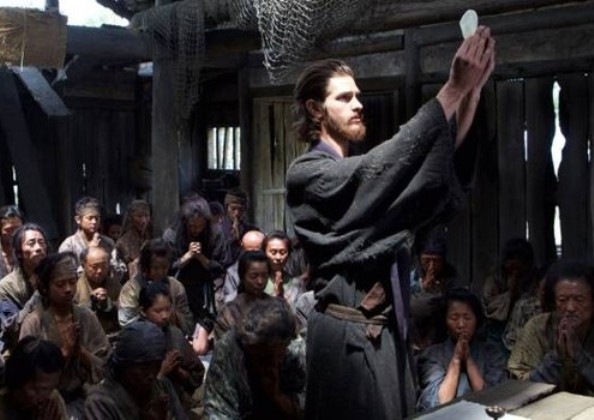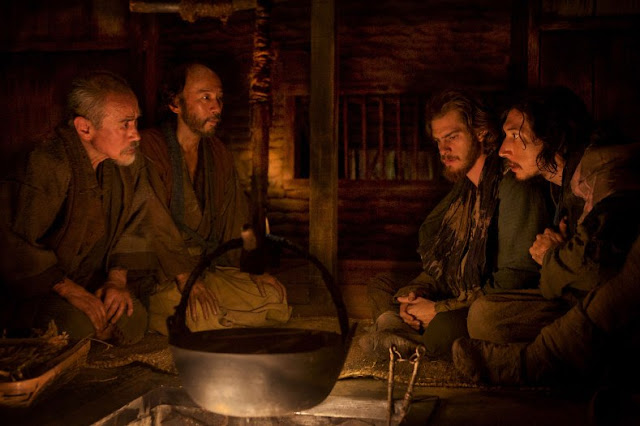By Murtaza Ali Khan
Featured in IMDb Critic Reviews
 |
| Silence (2016) - By Martin Scorsese |
There are two films in Martin Scorsese's oeuvre, which, for me,
make the legendary American filmmaker stand in the same league as Dreyer, Kurosawa,
Bergman, Kubrick, Fellini, Bunuel, Tarkovsky, Bresson, and Ray, among other
masters. While the first of the two was released about 3 decades back, the
second one is far more recent. While the first happens to be the most daring
film of his illustrious career, the second one is a testament to his remarkable
longevity and range as a filmmaker (remember, he made I Call First, his debut feature film, back in the year 1967). The
first one, of course, is The Last Temptation of Christ (1988). But which is the second one? Well, to give you a hint,
the film got callously snubbed by the Academy, getting just one Oscar
nomination—Best Achievement in Cinematography for Rodrigo Prieto. Yes, you
guessed it right! I am talking about Silence,
which has been selected by the American Film Institute as one of its ten movies
of the year. After a long wait, the film released in India on 17th February 2017.
Some of the leading film critics across the globe have described
Silence as boring and yet I didn't encounter a single moment in the film that
could even be remotely described as boring. Silence is an experience. It is everything
that cinema stands for. Alas, people seem to have forgotten what good old
storytelling is all about! The problem is that we rarely get to watch such kind
of powerful, cathartic cinema these days, at least from popular filmmakers.
Perhaps, Scorsese is one of the last few filmmakers who are still capable of
making films as diverse as The Wolf of Wall Street and Silence. While
the world admires Scorsese for making films like the former, I for one admire
him for his courage to every now and then taking the personal route. Silence is a deeply personal and meditative
film based on a 1966 award-winning Japanese novel of the same name by Shusaku
Endo.
 |
| Liam Neeson as Father Ferreira in Martin Scorsese's Silence |
Some critics have even described it as self-indulgent. But then Silence never promises to be a run-of-the-mill escapist entertainment. Silence is Scorsese's dream project and it took him over 25 years to realize it and every frame of the movie shows. There is a lyrical quality to Silence. The voice-over technique employed by Scorsese harks back to the films of Terrence Malick. Silence tells the story of two Jesuit priests, Sebastião Rodrigues (essayed by Andrew Garfield) and Francisco Garupe (essayed by Adam Driver), who undertake a journey from Portugal to Japan in the 17th century with the dual purpose of locating their missing mentor, Father Ferreira (essayed by Liam Neeson), and preaching Catholicism in the island nation. But the country's Buddhist regime has zero tolerance for anybody practicing or preaching an alien religion like Christianity. So, the two priests must suffer in the worst possible manner, physically as well as emotionally, while trying to grapple with existential dilemmas that force them to question their Christian faith and the very existence of God.
 |
| A Still from Martin Scorsese's Silence |
Scorsese is a devout Catholic himself and some may go to the
extent of calling Silence a Christian
propaganda film. But the themes that Silence
endeavors to explore are as much universal as they are about Christianity. They
are both timeless as well as contemporary. Now, Scorsese is the same filmmaker
who made films like Kundun, a film
about the Buddhist Dalai Lama, and The
Last Temptation of Christ, a film that dares to depict Jesus Christ as a
mortal being as opposed to the commonly accepted Biblical portrayal. The Last Temptation of Christ is arguably
the most controversial film dealing with Christianity made since Bunuel's Viridiana. In Silence, essentially a period film, Scorsese takes up themes that
are more relevant today than ever. Take, for example, the suppression of the
weak at the hands of the strong. How the authorities all over the world try to
suppress the voices of dissension. The film may also be seen as an allegory on
censorship. Now, Scorsese has been accused of portraying the Japanese as
evil. But, Silence actually is based on
a celebrated novel by an important Japanese author, Shusaku Endo, and so bear
in mind that it's not merely Scorsese but a synergistic symphony of Endo and Scorsese
that is on full display here. Besides, the movie doesn't depict all Japanese as
evil—there is both good as well as evil.
 |
| Andrew Garfield (right) and Adam Driver as Jesuit Priests in Silence |
Another complain about the film is its slow pacing. I bet the
same people would find Kurosawa's Dersu
Uzala slow paced. The beauty of Silence
is that the plot development never really halts; we are taken to different
places, both intellectually and viscerally. Scorsese directs his actors
brilliantly while giving them the liberty to express themselves, and the actors
don't disappoint. Andrew Garfield is a revelation in the role of a stoic Jesuit
priest who must face the ultimate test of faith. Garfield is so good in the
role that he deserved an Oscar nomination. Yes, I know that he is already
nominated for Hacksaw Ridge wherein
he delivers a topnotch performance but his portrayal in Silence is even more mesmerizing.
As a matter of fact, Garfield has never been better. He completely lays his
soul bare. He meticulously takes care of the nuances and plays the part with
great subtlety, never missing a single note during his demanding portrayal. In
fact, we get to experience his inner pain and suffering as if it were unfolding
right in front of our eyes.
 |
| A Still from Martin Scorsese's Silence |
Garfield gets good support from the co-actors. While Adam Driver
is superb in the role of the second Jesuit priest, it is the Japanese actors who steal the show with their sublime supporting acts—in particular Issei Ogata, Yôsuke Kubozuka, and Tadanobu Asano. Liam Neeson has a small
but crucial role in the film and he does indeed make his presence felt in the
limited screen time he gets. Another strong part of Silence is its
cinematography for which the movie has received its only nomination. The
attention to period detail is striking and even someone like Akira Kurosawa
would have been proud of Silence’s meticulous recreation of feudal Japan. Credit
goes to Scorsese and team for recreating 17th century Japan in
Taiwan. Needless to say, the scenes are beautifully choreographed. And,
although, it has been disqualified by the Academy’s music branch, the movie’s
minimalist score by Kathryn and Kim Allen Kluge that musically evokes the
sounds of nature—ocean, cricket, wind, rain, cicada insect, etc.—is nothing
short of a remarkable feat.
 |
| A Japanese Christian being forced by a samurai to spit on the cross and apostasize |
Silence is an unforgettable cinematic experience that will stay
with you long after the end credits stop rolling. There are scenes of such high
intensity that they will haunt you endlessly and make you question humanity as
well as your very existence. Silence distances the viewer from the action (perhaps
to lessen the intensity of suffering that the characters go through) and follows
a realistic approach to pose pertinent questions about humanity vis-à-vis
religion. How does religion affect our lives? How is religion often used by the
state as an instrument to exercise a control on the masses? How religion often hampers our intellectual growth
by forcing us to stop questioning the established norms? The film tries to
grapple with the common notions of sin and sinner. Silence also poses questions
about faith, God’s apparent indifference to human suffering, and God’s very existence—motifs that Bergman touched
upon in his ‘Faith’ trilogy comprising Through
a Glass Darkly, Winter Light, and
The Silence. But there are no answers
on offer, for Scorsese wants his viewers to find their own answers/ draw their own
conclusions.
 |
| Japanese Christians secretly meet the Jesuit Priests |
Vintage Scorsese, Silence
proves to be a powerful treatise on human existence. Here is a rare film that dares
to explore contentious themes which other filmmakers have eschewed from. Silence
is not meant for casual viewing. But it makes for an immersive cinematic experience
for a serious filmgoer. For those not used to watching this kind of realistic
cinema, Silence may demand patience
to begin but soon the senses would take over resulting in an experience of a
life time. Isn’t it exciting to think that at the age of 74, Martin Scorsese may
very well have delivered his best film yet? But what’s more exciting is the
idea that his next may even outdo Silence.
Rating: 9/10
References
Silence Trailer (YouTube)
Readers, please feel free to share your opinion by leaving your comments. As always your valuable thoughts are highly appreciated!
People who liked this also liked...


Hi Murtaza, This is a very thoughtful, well-written review of "Silence," a film which I appreciated for the sincerity of its production but had trouble with its themes (based--possibly unfairly--on my own experience as an ex-Catholic, as I noted in my review at http://filmreviewsfromtwoguysinthedark.blogspot.com/2017/02/2016-top-10-and-silence.html). I agree with all of the counter-arguments you present for the standard objections to this film but just couldn't get past its central message which I cannot embrace.
ReplyDeleteAs for Scorsese's best across a long career, it's hard to pick just a couple but for me they'd be "Raging Bull" and "The Departed." Ken